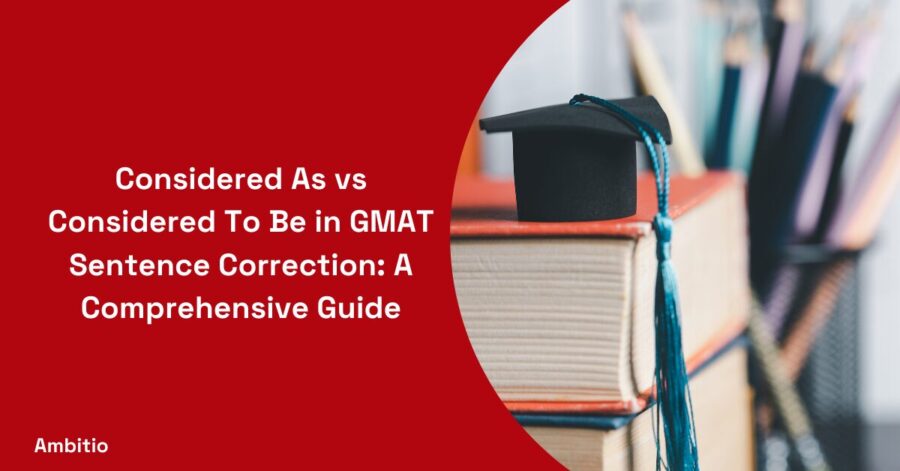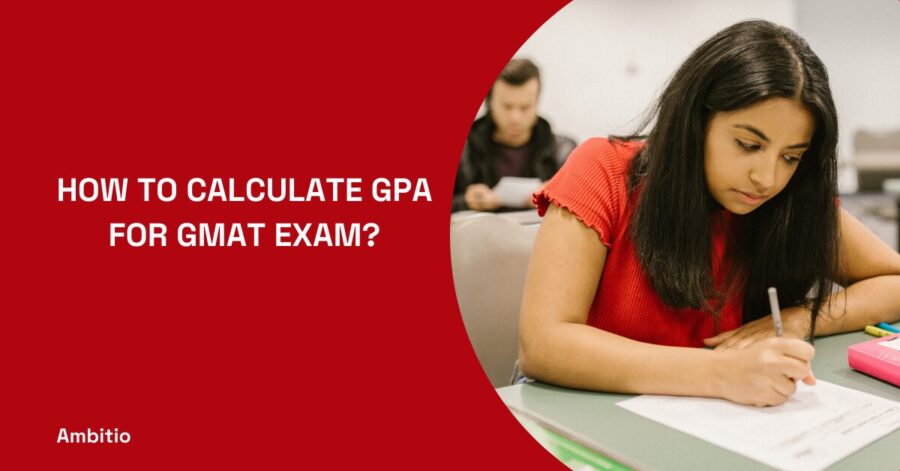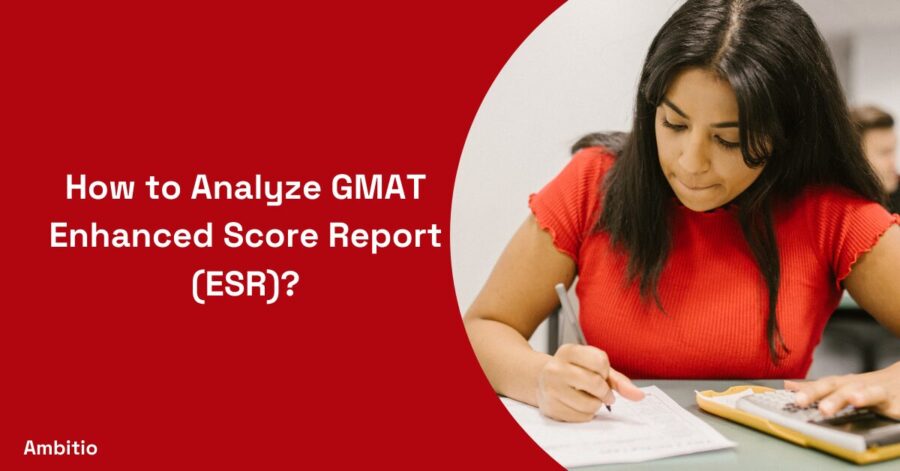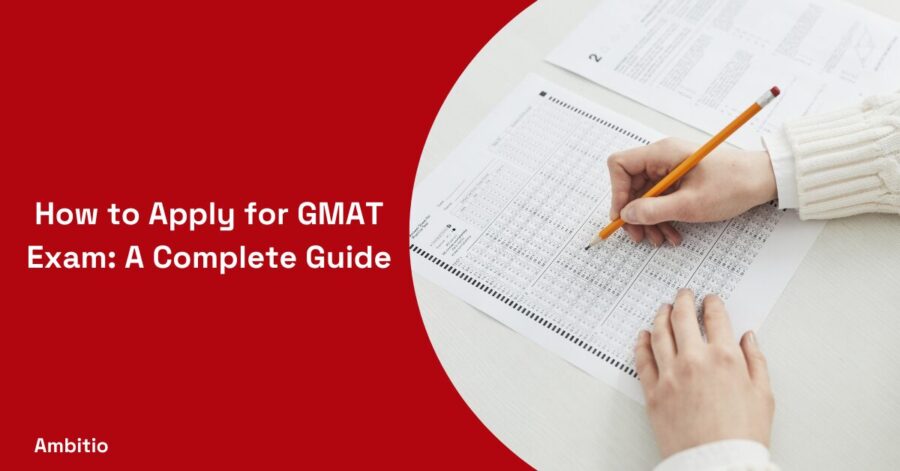12 December 2024
6 minutes read
Mastering Considered As vs Considered To Be in GMAT Sentence Correction: A Comprehensive Guide

Introduction
Navigating the intricate world of GMAT sentence correction can be a daunting task for many aspirants. One common stumbling block is the correct use of idiomatic expressions, particularly understanding the difference between “considered as” and “considered to be.” This blog delves deep into this topic, offering detailed analysis and practical advice to enhance your GMAT preparation.
The Role of Idiomatic Expressions in GMAT Sentence Correction
The Graduate Management Admission Test (GMAT) assesses various aspects of your language proficiency, with a special focus on your understanding of English grammar and idiomatic usage.
This is especially evident in the sentence correction (SC) portion of the exam, known as GMAT SC. Here, test-takers must demonstrate their ability to identify and correct grammatical errors, with a particular emphasis on the appropriate use of idiomatic expressions.
Understanding ‘Considered As’ vs ‘Considered To Be’ in GMAT SC
| Aspect | Considered As | Considered To Be |
|---|---|---|
| Grammatical Correctness | Often deemed grammatically incorrect or redundant in formal English. | Widely accepted as grammatically correct. |
| Usage in GMAT SC | Typically marked as incorrect in GMAT SC due to redundancy. | Preferred in GMAT SC for its precision and clarity. |
| Contextual Meaning | Implies a role or function, but the addition of “as” is usually unnecessary. | Used to express an opinion or state a fact about something. |
| Frequency in GMAT Questions | Less likely to appear as the correct option in GMAT questions. | Commonly appears incorrect answers for SC questions. |
| Impact on Answers | Using “considered as” can lead to a sentence being marked wrong due to redundancy or incorrect idiom usage. | Using “considered to be” is typically safe and aligns with standard English conventions. |
| Example Usage | Incorrect: “The novel is considered as a masterpiece in modern literature.” | Correct: “The novel is considered to be a masterpiece in modern literature.” |
| Expert Advice | Advised to avoid using “considered as” in GMAT SC prep and practice. | Recommended to use “considered to be” for clarity and correctness in GMAT SC. |
| Impact on GMAT Scores | Incorrect usage can negatively impact verbal scores due to grammatical errors. | Correct usage can enhance verbal scores by demonstrating proper idiomatic understanding. |
The GMAT’s Emphasis on Conciseness and Precision
In the context of the GMAT, choosing the most concise and grammatically correct sentence structure is crucial. Test-takers are often challenged to select the most effective way to convey a message with grammatical accuracy. This section will discuss how “considered to be” aligns with the GMAT’s emphasis on brevity and precision.
Strategies for Tackling Idiomatic Expressions in GMAT Prep
Understanding and correctly using idiomatic expressions is crucial for success in the GMAT, especially in the Sentence Correction (SC) section. Here are some effective strategies to help you tackle idiomatic expressions during your GMAT preparation:
- Familiarize with Common Idioms: Start by compiling a list of common idiomatic expressions tested in the GMAT. Resources like GMAT prep books and online forums can be invaluable for this.
- Contextual Learning: Don’t just memorize idioms; understand them in context. Practice by reading sentences or passages where these idioms are used, so you grasp their practical application.
- Regular Practice with Real GMAT Questions: Use official GMAT materials for practice. This will give you exposure to the way idioms are tested in actual exam conditions.
- Create Flashcards: Make flashcards for each idiom and its meaning. Regularly review these flashcards to reinforce your memory.
- Join Study Groups or Online Forums: Participate in GMAT study groups or online forums like GMAT Club. These platforms often discuss idiomatic usage and can provide additional insights and explanations.
- Use Mnemonics: Create mnemonic devices to remember tricky idioms. Associating them with visual images or related concepts can make them easier to recall.
- Incorporate Idioms in Daily Use: Try to use idioms in your everyday language. This practical application helps in better retention and understanding.
- Learn from Mistakes: When you get an idiom wrong in a practice test, spend time understanding why. Analyze the correct usage and remember it for future reference.
- Seek Expert Guidance: Consider enrolling in a GMAT prep course or hiring a tutor specializing in GMAT verbal content. They can provide expert insights and personalized feedback.
- Regular Review and Repetition: Revisit idioms periodically throughout your GMAT preparation. Regular repetition helps in long-term retention.
- Practice with Non-GMAT Materials: Read books, articles, and other materials in English. Pay attention to idiomatic expressions and their usage in different contexts.
- Understand the Logic Behind Idioms: Try to understand the logic or history behind certain idioms. This understanding can sometimes make them easier to remember and use correctly.
- Take Timed Practice Tests: Simulate exam conditions by taking timed practice tests. This will help you get used to applying your knowledge of idioms quickly and under pressure.
- Stay Updated: Occasionally, the GMAT may introduce new idiomatic expressions or patterns. Stay updated with the latest GMAT prep materials and forums.
- Focus on Precision: Remember that GMAT SC questions value precision and conciseness. Your understanding of idioms should align with this principle.
By incorporating these strategies into your GMAT prep, you’ll be better equipped to handle idiomatic expressions, a key aspect of the Sentence Correction section of the exam.
Analyzing Examples: ‘Considered As’ vs ‘Considered To Be’
Examples of “Considered As”
- Incorrect Usage: “The book was considered as an important contribution to modern literature.”
- Explanation: In this sentence, “as” is redundant. The phrase “considered as” is generally not preferred in standard English.
- Explanation: In this sentence, “as” is redundant. The phrase “considered as” is generally not preferred in standard English.
- Incorrect Usage: “Her work is considered revolutionary in the field of biotechnology.”
- Explanation: The use of “as” after “considered” is unnecessary and makes the sentence grammatically incorrect according to standard English norms.
- Explanation: The use of “as” after “considered” is unnecessary and makes the sentence grammatically incorrect according to standard English norms.
- Incorrect Usage: “The invention was considered as a significant milestone in the development of artificial intelligence.”
- Explanation: Here, “as” adds redundancy. The sentence would be clearer and more concise without it.
- Explanation: Here, “as” adds redundancy. The sentence would be clearer and more concise without it.
Examples of “Considered To Be”
- Correct Usage: “The book was considered to be an important contribution to modern literature.”
- Explanation: The phrase “considered to be” is correct and widely accepted. It clearly conveys that the book is regarded as important in modern literature.
- Explanation: The phrase “considered to be” is correct and widely accepted. It clearly conveys that the book is regarded as important in modern literature.
- Correct Usage: “Her work is considered to be revolutionary in the field of biotechnology.”
- Explanation: This sentence is grammatically correct. “Considered to be” is used appropriately to express the opinion that her work is revolutionary.
- Explanation: This sentence is grammatically correct. “Considered to be” is used appropriately to express the opinion that her work is revolutionary.
- Correct Usage: “The invention was considered to be a significant milestone in the development of artificial intelligence.”
- Explanation: The use of “considered to be” correctly conveys that the invention is regarded as a significant milestone, making the sentence grammatically sound and clear.
- Explanation: The use of “considered to be” correctly conveys that the invention is regarded as a significant milestone, making the sentence grammatically sound and clear.
In summary, “considered as” is generally seen as grammatically incorrect or redundant in English, particularly in formal contexts like GMAT Sentence Correction.
On the other hand, “considered to be” is the correct and preferred form, conveying the meaning more precisely and without unnecessary redundancy.
Common Mistakes and How to Avoid Them in GMAT Sentence Correction (SC)
The Sentence Correction (SC) section of the GMAT can be challenging, and certain common mistakes can significantly impact your score. Here are some of the frequent errors test-takers make, along with strategies to avoid them:
- Misinterpreting Idiomatic Expressions:
- Avoidance Strategy: Familiarize yourself with common GMAT idioms. Use reliable prep materials and practice extensively to understand the context in which these idioms are correctly used.
- Avoidance Strategy: Familiarize yourself with common GMAT idioms. Use reliable prep materials and practice extensively to understand the context in which these idioms are correctly used.
- Overlooking Subject-Verb Agreement Errors:
- Avoidance Strategy: Always check that the subject and verb in a sentence agree in number (singular/plural). Pay special attention to sentences with complex structures or intervening phrases.
- Avoidance Strategy: Always check that the subject and verb in a sentence agree in number (singular/plural). Pay special attention to sentences with complex structures or intervening phrases.
- Incorrectly Using Verb Tenses:
- Avoidance Strategy: Review and understand English verb tense rules. Ensure that the verb tense in a sentence correctly matches the time frame and logical sequence of events.
- Avoidance Strategy: Review and understand English verb tense rules. Ensure that the verb tense in a sentence correctly matches the time frame and logical sequence of events.
- Failing to Recognize Parallelism Errors:
- Avoidance Strategy: Look for lists or comparisons in sentences. Elements in a series or comparison should be in the same grammatical form to maintain parallelism.
- Avoidance Strategy: Look for lists or comparisons in sentences. Elements in a series or comparison should be in the same grammatical form to maintain parallelism.
- Misusing Modifiers:
- Avoidance Strategy: Ensure that modifiers (words, phrases, or clauses that provide additional information about another element in the sentence) are placed next to the word they are supposed to modify.
- Avoidance Strategy: Ensure that modifiers (words, phrases, or clauses that provide additional information about another element in the sentence) are placed next to the word they are supposed to modify.
- Neglecting Logical Meaning of Sentences:
- Avoidance Strategy: After correcting grammar, re-read the sentence to ensure it still makes logical sense. Sometimes, grammatically correct sentences can be logically flawed.
- Avoidance Strategy: After correcting grammar, re-read the sentence to ensure it still makes logical sense. Sometimes, grammatically correct sentences can be logically flawed.
- Ignoring Conciseness:
- Avoidance Strategy: Prefer more concise expressions unless they lead to loss of clarity or change in meaning. Avoid redundancy and unnecessary complexity.
- Avoidance Strategy: Prefer more concise expressions unless they lead to loss of clarity or change in meaning. Avoid redundancy and unnecessary complexity.
- Pronoun Ambiguity and Misuse:
- Avoidance Strategy: Check that all pronouns clearly and unambiguously refer to a specific noun. Also, ensure that the pronoun agrees in number and gender with its antecedent.
- Avoidance Strategy: Check that all pronouns clearly and unambiguously refer to a specific noun. Also, ensure that the pronoun agrees in number and gender with its antecedent.
- Falling for Trap Answers:
- Avoidance Strategy: Be aware that some answer choices are designed to look correct but contain subtle errors. Always cross-check each option carefully.
- Avoidance Strategy: Be aware that some answer choices are designed to look correct but contain subtle errors. Always cross-check each option carefully.
- Over-reliance on Ear:
- Avoidance Strategy: Don’t rely solely on how a sentence sounds. Some incorrect constructions might sound fine but don’t adhere to formal English grammar rules.
- Avoidance Strategy: Don’t rely solely on how a sentence sounds. Some incorrect constructions might sound fine but don’t adhere to formal English grammar rules.
- Not Reading All Answer Choices:
- Avoidance Strategy: Go through all the answer choices before selecting one. Sometimes, the best choice is not immediately obvious.
- Avoidance Strategy: Go through all the answer choices before selecting one. Sometimes, the best choice is not immediately obvious.
- Ignoring the Non-Underlined Portion of the Sentence:
- Avoidance Strategy: Consider the entire sentence, not just the underlined portion, to ensure overall sentence coherence and correctness.
- Avoidance Strategy: Consider the entire sentence, not just the underlined portion, to ensure overall sentence coherence and correctness.
- Lack of Time Management:
- Avoidance Strategy: Practice time management in your prep. Learn to quickly identify and correct errors to avoid spending too much time on one question.
- Avoidance Strategy: Practice time management in your prep. Learn to quickly identify and correct errors to avoid spending too much time on one question.
- Insufficient Practice with Complex Sentences:
- Avoidance Strategy: Include complex sentences in your practice. The GMAT often tests the understanding of sentences with multiple clauses and complex structures.
- Avoidance Strategy: Include complex sentences in your practice. The GMAT often tests the understanding of sentences with multiple clauses and complex structures.
- Not Reviewing Basic Grammar Rules:
- Avoidance Strategy: Regularly review basic grammar rules. A strong foundation in English grammar is crucial for success in GMAT SC.
- Avoidance Strategy: Regularly review basic grammar rules. A strong foundation in English grammar is crucial for success in GMAT SC.
By being aware of these common mistakes and actively working to avoid them, you can significantly improve your performance in the GMAT Sentence Correction section.
Remember, consistent practice and a thorough understanding of English grammar and idiomatic expressions are key to mastering GMAT SC.
Conclusion
Understanding and correctly applying idiomatic expressions, such as “considered as” and “considered to be,” is a key component of succeeding in the GMAT sentence correction section.
Through careful study, practice, and the use of various resources, you can master this aspect of the English language, boosting your overall GMAT performance.
FAQs
Why is “considered to be” preferred over “considered as” in GMAT SC?
“Considered to be” is preferred because it is more concise and grammatically correct, aligning with the GMAT’s emphasis on precision and clarity.
Can mastering idiomatic expressions significantly improve my GMAT verbal score?
Yes, a strong understanding and correct application of idiomatic expressions can greatly improve your performance in the GMAT verbal section.
How can I practice idiomatic expressions effectively for the GMAT?
Practice through GMAT prep materials, participate in forums, and focus on exercises that challenge your understanding of idiomatic usage.
Are there any specific resources you recommend for mastering GMAT SC?
Resources such as official GMAT guides, online forums like GMAT Club, and prep courses from providers like Manhattan Prep are highly beneficial.

You can study at top universities worldwide!
Get expert tips and tricks to get into top universities with a free expert session.
Book Your Free 30-Minute Session Now! Book a call now




























